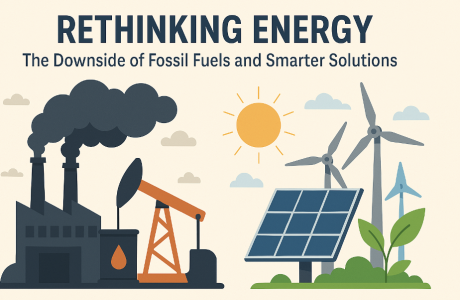Widgetized Section
Go to Admin » Appearance » Widgets » and move Gabfire Widget: Social into that MastheadOverlay zone
Rethinking Energy: The Downside of Fossil Fuels and Smarter Solutions
The views expressed are those of the author and do not necessarily reflect the views of ASPA as an organization.
By Biswanath Bhattacharjee
May 5, 2025

Introduction
Fossil fuels—coal, oil and natural gas—have long been the backbone of global energy production. They have powered industries, fueled transportation and supported economic growth for centuries. However, as the world grapples with climate change, environmental degradation and energy security concerns, the limitations of fossil fuels have become increasingly evident. The over-reliance on these non-renewable energy sources poses significant risks, including greenhouse gas emissions, pollution and geopolitical conflicts. This article explores the potential shortcomings of fossil fuels and presents viable solutions to mitigate their negative impacts.
Shortcomings of Fossil Fuels
1. Environmental Impact and Climate Change
One of the most pressing concerns associated with fossil fuels is their contribution to climate change. The burning of coal, oil and natural gas releases large amounts of carbon dioxide (CO2) and other greenhouse gases into the atmosphere, leading to global warming. The increase in average global temperatures has resulted in more frequent and intense natural disasters, rising sea levels and disruptions to ecosystems.
Additionally, fossil fuel extraction and usage contribute to environmental degradation. Oil spills, coal mining and fracking have devastating consequences on biodiversity, water sources and air quality. These activities often leave behind toxic residues, causing long-term harm to the environment and human health.
2. Finite Supply and Energy Security Risks
Fossil fuels are non-renewable resources, meaning their reserves are limited and depleting at a rapid rate. As global energy demands increase, the competition for fossil fuel resources intensifies, leading to energy security risks. Many countries depend on foreign oil and gas imports, making them vulnerable to geopolitical conflicts and price volatility. Political instability in oil-producing regions can disrupt supply chains, causing economic uncertainty and energy crises.
3. Air Pollution and Public Health Issues
The burning of fossil fuels releases harmful pollutants such as sulfur dioxide (SO2), nitrogen oxides (NOx) and particulate matter, which contribute to smog formation and respiratory diseases. Prolonged exposure to air pollution is linked to health conditions such as asthma, lung cancer and cardiovascular diseases. Additionally, indoor air pollution from coal and biomass combustion in developing countries continues to be a major public health concern.
4. Economic Costs and Market Fluctuations
The extraction, refining and transportation of fossil fuels require substantial investments. Market fluctuations in oil and gas prices can lead to economic instability, affecting both consumers and businesses. Price volatility is influenced by geopolitical tensions, natural disasters and supply chain disruptions, making energy costs unpredictable. Moreover, fossil fuel subsidies divert significant government resources that could be allocated to renewable energy development and social welfare programs.
Solutions to Fossil Fuel Challenges
1. Transition to Renewable Energy Sources
One of the most effective ways to reduce dependence on fossil fuels is by expanding the use of renewable energy sources such as solar, wind, hydro and geothermal power. These energy sources are abundant, sustainable and emit little to no greenhouse gases. Governments and private industries must invest in renewable energy infrastructure, research and development to make clean energy more accessible and cost-effective.
2. Energy Efficiency and Conservation Measures
Improving energy efficiency in industries, homes and transportation can significantly reduce fossil fuel consumption. Advances in technology, such as energy-efficient appliances, LED lighting and smart grids, help optimize energy use and minimize waste. Encouraging sustainable practices, such as carpooling, public transportation and green building designs, can also contribute to energy conservation.
3. Carbon Capture and Storage (CCS) Technologies
To mitigate carbon emissions from fossil fuel use, carbon capture and storage (CCS) technologies have been developed. CCS involves capturing CO2 emissions from power plants and industrial facilities and storing them underground or utilizing them for other industrial processes. While CCS is not a complete solution, it can play a crucial role in reducing greenhouse gas emissions during the transition to cleaner energy sources.
4. Policy Reforms and Incentives for Green Energy
Governments play a critical role in shaping energy policies that promote sustainability. Implementing carbon pricing, such as carbon taxes or cap-and-trade programs, can encourage industries to adopt cleaner technologies. Subsidizing renewable energy projects and phasing out fossil fuel subsidies can help accelerate the shift toward a greener economy. International cooperation is also necessary to enforce regulations and commitments to reduce carbon emissions globally.
5. Technological Innovations in Energy Storage and Grid Modernization
One of the challenges of renewable energy adoption is the intermittent nature of sources like solar and wind. Advancements in battery storage technologies, such as lithium-ion and solid-state batteries, can enhance energy storage capacity and improve grid stability. Additionally, modernizing power grids with smart technologies can optimize energy distribution and reduce energy losses, making renewable energy more reliable.
Conclusion
The shortcomings of fossil fuels—ranging from environmental damage to economic instability—highlight the urgent need for alternative energy solutions. While fossil fuels will likely remain part of the energy mix in the near future, a proactive transition toward renewable energy, energy efficiency, and innovative technologies can mitigate their negative impacts. Governments, industries and individuals must collaborate to accelerate the adoption of sustainable energy solutions. By embracing cleaner energy sources and implementing policy reforms, societies can reduce their reliance on fossil fuels and build a more sustainable and resilient energy future.
Author: Biswanath Bhattacharjee is an accomplished public administration professional and legal educator with over two decades of experience across academia, legal practice, research, and the nonprofit sector. He holds a Master of Public Administration (MPA) from Gannon University, with a concentration in Management Science and Quantitative Methods. His interdisciplinary background fuels innovative approaches to governance, policy analysis, and organizational leadership. He can be contacted at [email protected].


AKM Masud
May 6, 2025 at 11:01 am
very timely write up, thanks to the author of this column! Hope this will help rethink the leaders for better alternatives.